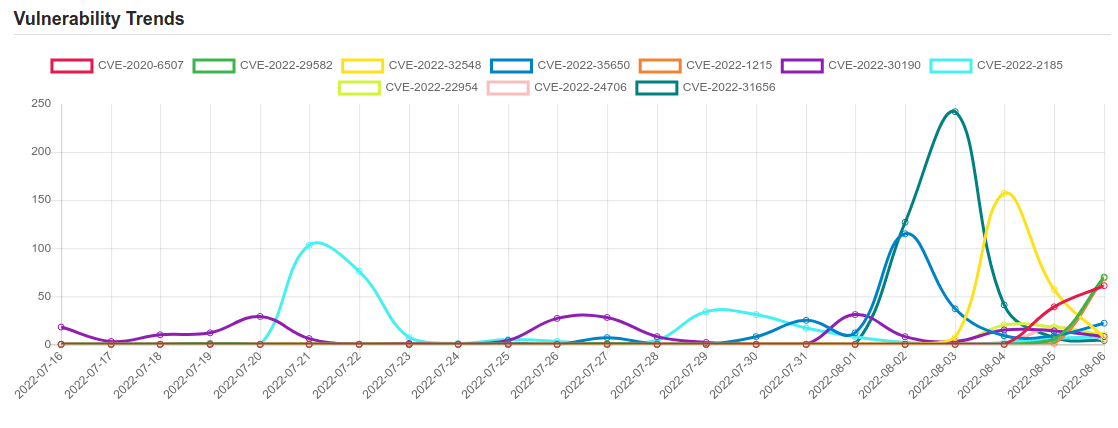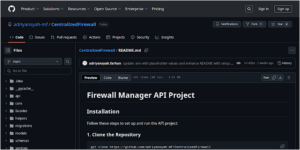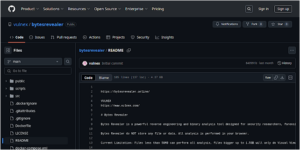Daily Vulnerability Trends: Sun Aug 07 2022

| CVE NAME | CVE Description |
| CVE-2022-31661 | VMware Workspace ONE Access, Identity Manager and vRealize Automation contain two privilege escalation vulnerabilities. A malicious actor with local access can escalate privileges to ‘root’. |
| CVE-2022-31660 | VMware Workspace ONE Access, Identity Manager and vRealize Automation contains a privilege escalation vulnerability. A malicious actor with local access can escalate privileges to ‘root’. |
| CVE-2022-31181 | PrestaShop is an Open Source e-commerce platform. In versions from 1.6.0.10 and before 1.7.8.7 PrestaShop is subject to an SQL injection vulnerability which can be chained to call PHP’s Eval function on attacker input. The problem is fixed in version 1.7.8.7. Users are advised to upgrade. Users unable to upgrade may delete the MySQL Smarty cache feature. |
| CVE-2022-33318 | Deserialization of Untrusted Data vulnerability in ICONICS GENESIS64 versions 10.97.1 and prior and Mitsubishi Electric MC Works64 versions 4.04E (10.95.210.01) and prior allows a remote unauthenticated attacker to execute an arbitrary malicious code by sending specially crafted packets to the GENESIS64 server. |
| CVE-2022-34918 | An issue was discovered in the Linux kernel through 5.18.9. A type confusion bug in nft_set_elem_init (leading to a buffer overflow) could be used by a local attacker to escalate privileges, a different vulnerability than CVE-2022-32250. (The attacker can obtain root access, but must start with an unprivileged user namespace to obtain CAP_NET_ADMIN access.) This can be fixed in nft_setelem_parse_data in net/netfilter/nf_tables_api.c. |
| CVE-2022-33891 | The Apache Spark UI offers the possibility to enable ACLs via the configuration option spark.acls.enable. With an authentication filter, this checks whether a user has access permissions to view or modify the application. If ACLs are enabled, a code path in HttpSecurityFilter can allow someone to perform impersonation by providing an arbitrary user name. A malicious user might then be able to reach a permission check function that will ultimately build a Unix shell command based on their input, and execute it. This will result in arbitrary shell command execution as the user Spark is currently running as. This affects Apache Spark versions 3.0.3 and earlier, versions 3.1.1 to 3.1.2, and versions 3.2.0 to 3.2.1. |
| CVE-2022-29154 | An issue was discovered in rsync before 3.2.5 that allows malicious remote servers to write arbitrary files inside the directories of connecting peers. The server chooses which files/directories are sent to the client. However, the rsync client performs insufficient validation of file names. A malicious rsync server (or Man-in-The-Middle attacker) can overwrite arbitrary files in the rsync client target directory and subdirectories (for example, overwrite the .ssh/authorized_keys file). |
| CVE-2022-20233 | In param_find_digests_internal and related functions of the Titan-M source, there is a possible out of bounds write due to an incorrect bounds check. This could lead to local escalation of privilege with System execution privileges needed. User interaction is not needed for exploitation.Product: AndroidVersions: Android kernelAndroid ID: A-222472803References: N/A |
| CVE-2020-6507 | Out of bounds write in V8 in Google Chrome prior to 83.0.4103.106 allowed a remote attacker to potentially exploit heap corruption via a crafted HTML page. |
| CVE-2022-29582 | In the Linux kernel before 5.17.3, fs/io_uring.c has a use-after-free due to a race condition in io_uring timeouts. This can be triggered by a local user who has no access to any user namespace; however, the race condition perhaps can only be exploited infrequently. |
| CVE-2022-35650 | The vulnerability was found in Moodle, occurs due to input validation error when importing lesson questions. This insufficient path checks results in arbitrary file read risk. This vulnerability allows a remote attacker to perform directory traversal attacks. The capability to access this feature is only available to teachers, managers and admins by default. |
| CVE-2022-30190 | Microsoft Windows Support Diagnostic Tool (MSDT) Remote Code Execution Vulnerability. |
| CVE-2022-2185 | A critical issue has been discovered in GitLab affecting all versions starting from 14.0 prior to 14.10.5, 15.0 prior to 15.0.4, and 15.1 prior to 15.1.1 where an authenticated user authorized to import projects could import a maliciously crafted project leading to remote code execution. |
| CVE-2022-22954 | VMware Workspace ONE Access and Identity Manager contain a remote code execution vulnerability due to server-side template injection. A malicious actor with network access can trigger a server-side template injection that may result in remote code execution. |
| CVE-2022-24706 | In Apache CouchDB prior to 3.2.2, an attacker can access an improperly secured default installation without authenticating and gain admin privileges. The CouchDB documentation has always made recommendations for properly securing an installation, including recommending using a firewall in front of all CouchDB installations. |
| CVE-2022-27924 | Zimbra Collaboration (aka ZCS) 8.8.15 and 9.0 allows an unauthenticated attacker to inject arbitrary memcache commands into a targeted instance. These memcache commands becomes unescaped, causing an overwrite of arbitrary cached entries. |
| CVE-2022-25168 | Apache Hadoop’s FileUtil.unTar(File, File) API does not escape the input file name before being passed to the shell. An attacker can inject arbitrary commands. This is only used in Hadoop 3.3 InMemoryAliasMap.completeBootstrapTransfer, which is only ever run by a local user. It has been used in Hadoop 2.x for yarn localization, which does enable remote code execution. It is used in Apache Spark, from the SQL command ADD ARCHIVE. As the ADD ARCHIVE command adds new binaries to the classpath, being able to execute shell scripts does not confer new permissions to the caller. SPARK-38305. “Check existence of file before untarring/zipping”, which is included in 3.3.0, 3.1.4, 3.2.2, prevents shell commands being executed, regardless of which version of the hadoop libraries are in use. Users should upgrade to Apache Hadoop 2.10.2, 3.2.4, 3.3.3 or upper (including HADOOP-18136). |
| CVE-2022-32548 | Multiple DrayTek Vigor Routers buffer overflow | CVE-2022-32548 |
| CVE-2022-1215 | libinput code execution | CVE-2022-1215 |
| CVE-2022-31656 | VMware Workspace ONE Access, Identity Manager and vRealize Automation security bypass | CVE-2022-31656 |
A considerable amount of time and effort goes into maintaining this website, creating backend automation and creating new features and content for you to make actionable intelligence decisions. Everyone that supports the site helps enable new functionality.
If you like the site, please support us on Patreon using the button below

To keep up to date follow us on the below channels.






![Cobalt Strike Beacon Detected - 185[.]9[.]146[.]38:80 8 Cobalt-Strike](https://www.redpacketsecurity.com/wp-content/uploads/2021/11/Cobalt-Strike-300x201.jpg)